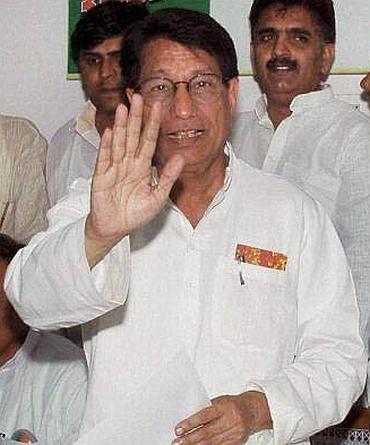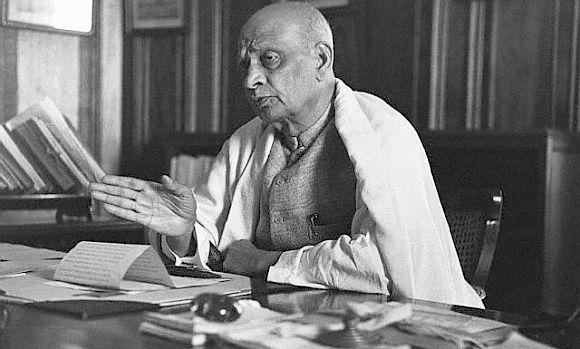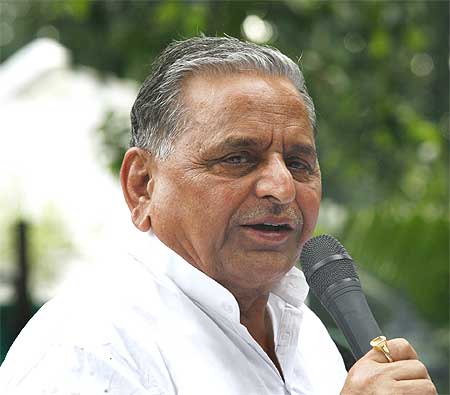 | « Back to article | Print this article |
The inheritor: Ajit Singh has big shoes to fill
It has been almost a month since Ajit Singh was sworn in as India's civil aviation minister.
Many Indians may be unaware that Ajit Singh owes his political influence to the fact he is his father Chaudhuri Charan Singh's only son.
Though he passed into the ages nearly 25 years ago, former prime minister Charan Singh's legacy lives on in his native Uttar Pradesh, indeed among the Jat peasantry of north India.
Charan Singh was both a politically ambitious man and a man with dear policy proposals.
His political life, therefore, raises the issue of how one successfully pursues both power and policy in a rough-and-tumble representative political system.
An extract from a fascinating, new, biography of the late leader by the distinguished American academic, Paul R Brass.
Chaudhuri Charan Singh, prime minister of India for a brief period after the fall of the Janata Party government in 1979, and twice chief minister of Uttar Pradesh during his long political career in that state, played major roles in transforming the agricultural economy of northern India in the post-Independence period and the politics of his home state and of the country as a whole during the last two decades of his life.
Four aspects of his political career and his influence on contemporary north Indian politics seem to me to be especially important. First is the fact that his political career involved him at all levels of the Indian political system. Second, he became identified as the principal spokesman of the middle peasantry of India.
Third, he was identified also with the aspirations of the so-called backward castes of intermediate social status between the elite castes and the lower castes. Fourth, he wrote a number of books, as well as political pamphlets, that presented an extremely sophisticated and coherent alternative development strategy for India, entirely different from that of former prime ministers, Jawaharlal Nehru and Indira Gandhi.
Extracted from An Indian Political Life: Charan Singh and Congress Politics, 1937 to 1961, by Paul R Brass, with the publisher's permission.
Please click on Next to read further...
Political impact: From Meerut to Lucknow to Delhi
Charan Singh was one of the last important leaders of the country whose active political life spanned the pre-Independence Congress political movements and post-Independence party politics up through the prime ministership of Rajiv Gandhi.
He belonged to a generation of politicians whose political experience encompassed district, state, and national politics.
During the last two decades of his life, he moved out of the Congress into Opposition and provided thereafter the central core of support for the Janata Party, the first political coalition to defeat the Congress and form a government at the Centre.
His influence persists up to the present as several of the principal contenders for Opposition leadership in north Indian politics struggle to gain preponderance over the political base which he controlled at the end of his life.
Charan Singh also held clear and strong views on most aspects of state policy and administration during these years. As economic development expenditure became increasingly wasteful, as corruption became increasingly pervasive, especially in some of the most development-oriented departments of government, and as the vastly increased number of government employees ate up even more of the available funds for development, Charan Singh stood forth for close control of government expenditure, for stern measures to deal with corrupt officers, and for a firm hand in dealing with the demands of government employees for increased wages and dearness allowances.
In fact, Charan Singh was a strong advocate of firmness in maintaining law and order in general, including curbing the activities of political opposition and trade union movements and strikes.
On April 1, 1967, Charan Singh defected from the Congress to join the Opposition and then became the first non-Congress chief minister of the critical state of UP. He was one of the principal leaders in the politics of the period from 1967 to 1971, when non-Congress governments were in power, having himself inaugurated this period by his defection.
During this period, he created a political movement and a new agrarian party, the Bharatiya Kranti Dal, whose core consisted of the middle status, middle size cultivating castes.
The goals of this movement were to reorient the economic development policies of the state and the country as a whole away from large-scale industrialisation, big dams, and consumer industries for the urban middle classes toward policies emphasising investment in agricultural for the benefit of the rural cultivating groups and to provide employment in the countryside in small-scale industry for those without land of their own.
Extracted from An Indian Political Life: Charan Singh and Congress Politics, 1937 to 1961, by Paul R Brass, with the publisher's permission.
Please click on Next to read further...
Charan Singh's focus shifted to the Centre from the mid-1970s
Charan Singh's penchant for dealing firmly with threats to public order was apparent during his two periods of tenure as chief minister of UP. After his second term, which lasted only seven months, I asked him what he considered to be the achievements of his brief ministry.
His response focused upon measures he took to prevent disruption of public order and the political activities of opposition forces; his firm handling of a Communist Party-led land grab movement, the banning of compulsory membership in university student unions, the relative absence of strikes during his tenure, and his breaking of the one major strike which did occur
Such measures partly reflected Charan Singh's concerns to avoid the loss of government financial integrity through drains upon its resources as well as antagonism to the demands of urban workers whom he considered privileged in comparison with most rural folk.
At the same time, there is no doubt that Chaudhuri Sahib (as he was usually called), like his political mentor, Sardar Patel, believed strongly in the utmost importance of maintaining public peace.
From the mid-1970s until his death in 1987, the focus of Charan Singh's political activities shifted to the Centre. This period includes the Emergency, the formation of the Janata Party, the formation of the Janata government, and the dissolution of the latter in July 1979. In all these events, Charan Singh played a central role.
His political organisation and support base in northern India constituted the core of the successful Janata Party which defeated Mrs Indira Gandhi in the post-Emergency election of 1977. Frustrated at his failure to be selected prime minister of the country, he and his supporters formed a group in and outside the government of Morarji Desai and ultimately brought it down in 1979.
In doing so, Charan Singh was accused of rank opportunism and lust for power with no regard for the interests of the country. Nevertheless, even at this time, Charan Singh behaved as something more than an opportunist politician. For, throughout this period, he continued to articulate an alternative economic programme for the country and to support policies favouring agriculture and the peasantry.
In the midst of the crises which marked his conflicts with Morarji Desai, on December 23, 1978, hundreds of thousands of the peasantry of northern India, particularly from western UP and Haryana, were mobilised in his support in the capital itself.
This intrusion of countless dhoti-clad peasants in the nation's capital confronted its bureaucratic and intellectual classes, many of whom had never visited a village in their lives, with a spectacle which they resented deeply and mocked.
For many planners and intellectuals in Delhi, these people are an abstraction, not a reality. They represent backwardness, encrusted tradition and uncouthness, people best kept out of sight while the country 'modernises'.
Extracted from An Indian Political Life: Charan Singh and Congress Politics, 1937 to 1961, by Paul R Brass, with the publisher's permission.
Please click on Next to read further...
Charan Singh's influence persisted beyond his death
Thus, however opportunistically he behaved, Charan Singh confronted his opponents and the country with alternative policies and forced them to face the reality of the presence in the capital of the people in whose name they all claimed to speak.
In the 1980 elections, Charan Singh's Lok Dal emerged as the largest non-Congress party and he became Leader of the Opposition in Parliament. He felt personally demoralised after the landslide election victory of Rajiv Gandhi in the 1984 elections, which reduced the representation of the Lok Dal to only two seats in Parliament.
However, his party remained the second largest in UP and the most important non-Congress party in the northern Indian plain until his death.
Moreover, Charan Singh's influence persisted beyond his death in 1987 as his political successors struggled to gain control over his former political base. They included his son Ajit Singh; the former chief minister of UP, Mulayam Singh Yadav; and the former prime minister, V P Singh.
Ajit Singh's claim is based on the right of natural succession, but Mulayam Singh Yadav, Ajit's rival in UP politics, claims to be Charan Singh's true political heir, which he reinforces by saying that the latter had referred to him as 'my son.'
V P Singh made the boldest claim of all in August 1990 with his decision to implement the Mandal Commission recommendation on reservation of places for backward castes in public sector services under the central government, thereby seeking to consolidate the hold on the backward castes of the Janata Party under his leadership.
Clearly, therefore, in the course of his political career, Charan Singh played a central role in several of the most crucial turning points in the history of the politics of India's largest state and that of the country as a whole.
In addition to his role as a precipitator of crises or a central force in crisis periods in Indian politics, Charan Singh's participation in politics and his roles in these crises are of particular interest also for other reasons.
During his long political career, he demonstrated mastery of the multiple 'idioms' of Indian politics: the 'traditional' idiom of caste and faction; the 'modern' idiom of party, parliamentary behaviour, and economic development planning; and the 'saintly' idiom of the crusader against corruption in Indian public life.
Charan Singh was both a politically ambitious man and a man with dear policy proposals. His political life, therefore, raises the issue of how one successfully pursues both power and policy in a rough-and-tumble representative political system.
Extracted from An Indian Political Life: Charan Singh and Congress Politics, 1937 to 1961, by Paul R Brass, with the publisher's permission.
Please click on Next to read further...
Check out our top slideshows
Click on MORE to see another set of PHOTO features...



